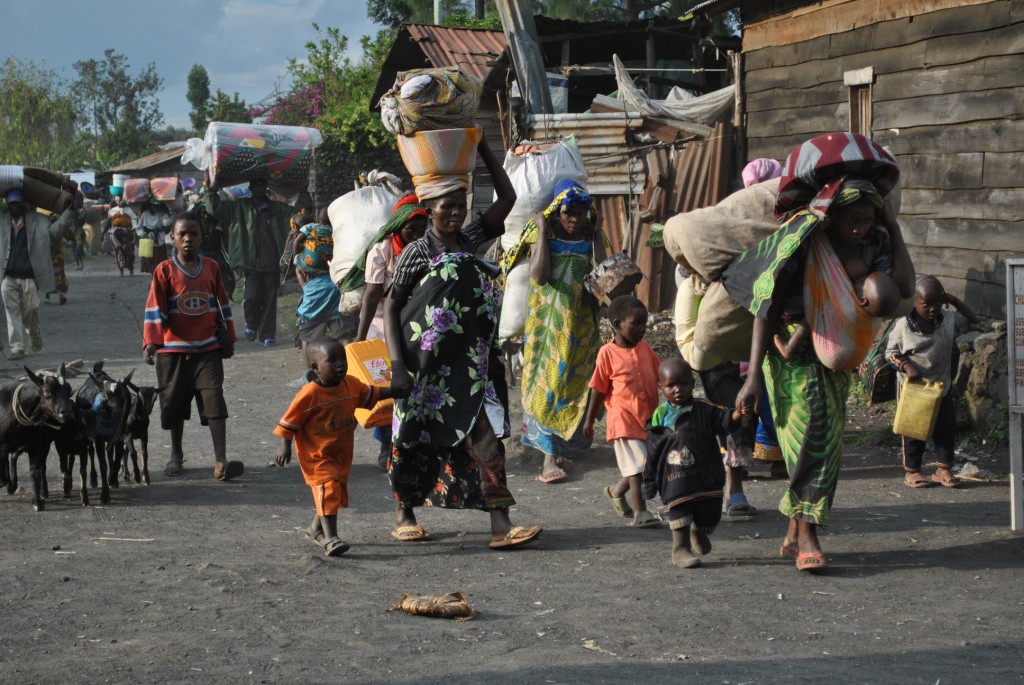Almost 20,000 flee fresh fighting in eastern Congo's North Kivu province
Almost 20,000 flee fresh fighting in eastern Congo's North Kivu province

GOMA, Democratic Republic of the Congo, May 4 (UNHCR) - More than 20,000 people have fled fighting between government forces and renegade troops in eastern Congo in recent days and found shelter in areas near the provincial capital of Goma, UNHCR said Friday.
Meanwhile, UNHCR staff in Rwanda, said that as of Thursday evening, around 4,100 civilians had crossed the border at the Goma-Gisenyi crossing and been transferred to a transit centre, where they were receiving basic aid.
UNHCR field staff say people are still coming toward the North Kivu capital, Goma, and its environs from their homes in the affected Masisi and Walikale territories, but the flow has eased a bit. UNHCR staff have registered 10,300 people at a spontaneous site 25 kilometres from Goma and 9,000 in Mugunga III, one of 31 UNHCR-run settlements for internally displaced people (IDP) in North Kivu.
People are arriving at the two sites exhausted and hungry. They are carrying mattresses and buckets loaded with basic items. Many have children with them. Hundreds are sleeping in a school and church at the spontaneous site at Sake, while about 1,000 people are heading to South Kivu.
"We are working with our partners to provide assistance, including shelter and other non-food items," UNHCR spokesman Adrian Edwards said on Friday. "Our protection staff are in the field monitoring needs and identifying the most vulnerable internally displaced people (IDPs)."
The latest figures add to the already massive displacement numbers recorded in North Kivu and neighbouring South Kivu so far this year. Conflict in the first quarter of the year is estimated to have displaced around 300,000 people, according to figures compiled by the UN Office for the Coordination of Humanitarian Affairs (OCHA) with input provided by UNHCR and other organizations. With the latest figures, more than 2 million people are now uprooted countrywide, including 1.4 million people in the two Kivus.
Most of the displaced are in South Kivu where, in the first three months of this year, 220,000 people have fled continuing clashes between the rebel Democratic Forces for the Liberation of Rwanda (FDLR) and the Mai Mai militia. Displacement has also been seen from joint military action by UN peacekeepers and the Congolese armed forces, although this operation has now been suspended.
In North Kivu, fighting between government forces and soldiers loyal to former rebel commander Bosco Ntaganda intensified in April. An estimated 58,000 were newly displaced in the province between January and March. Thousands more moved in April.
We are particularly concerned for some 38,000 displaced people in Masisi and Walikale territories, which are located west and north-west of Goma. UNHCR is unable to access these people because of the insecurity. Many are in IDP settlements located in areas now under the influence of rebel or militia groups. They include the Mpati site, where there were more than 9,000 people, as well as Nyange (1,305 people) and Kivuye (2,717 people).
Displaced people who fled from Mpati have reported cases of harassment, forced labour and extortion. There have also been disturbing reports of rape late last week in Walikale territory.
UNHCR is appealing to all sides to urgently allow humanitarian access to these vulnerable groups and to respect their rights, including the rights to safety, medical help and freedom of movement. We also stress how important it is to maintain the civilian character of the camps and we urge the provincial authorities to increase security in and around the camps where possible.
Meanwhile, our office in Rwanda reports that an average of 1,000 people a day have been crossing into Rwanda at the Goma-Gisenyi border point since the weekend. Most are women, children and the elderly coming from Masisi and Walikale, via Goma. The new arrivals are being transferred to a transit centre about 20 kilometres inside Rwanda and receiving humanitarian assistance.
By Simplice Kpandji in Goma, Democratic Republic of the Congo, and Anouck Bronee in Gisenyi, Rwanda








